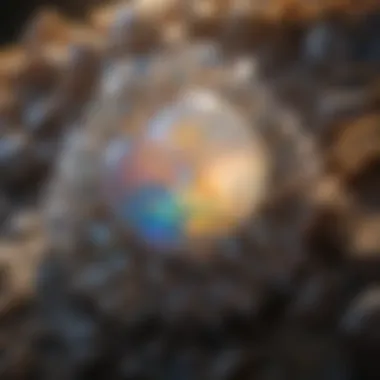Unveiling the Mystique of Shimmering Rock Varieties: A Geological Journey


Rock and Fossil Identification
To embark on a journey into the mesmerizing world of sparkly rock types, one must first master the art of rock and fossil identification. Various types of rocks and fossils abound in nature, each holding unique characteristics waiting to be unveiled by the discerning eye. Shimmering crystals and glistening gemstones offer glimpses into Earth's ancient history, with geological and aesthetic significance intertwining seamlessly. As aspiring collectors delve into this realm, keen observation becomes paramount. Characteristics such as color, luster, hardness, and texture serve as essential markers in distinguishing between different rock types. Tools for identification, ranging from magnifying lenses to basic testing kits, play a crucial role in the meticulous categorization of specimens.
Collecting Tips and Techniques
With a newfound appreciation for the intricacies of rock identification, collectors can elevate their experience through comprehensive collecting tips and techniques. Best practices for collecting sparkly rock types entail thorough research on prime collecting sites, each holding hidden treasures waiting to be unearthed. The discerning collector must hone their skills in safely extracting specimens, ensuring minimal impact on both the environment and the delicate rocks. Locating prime collecting sites demands a blend of geological knowledge and exploration prowess, with a keen eye for detail guiding enthusiasts towards valuable finds. Understanding the geological context of each specimen enhances the collecting experience, turning each find into a tangible piece of Earth's narrative.
Preservation and Display
For those captivated by the allure of sparkly rock types, preservation and display techniques are essential to immortalizing the beauty of their collections. Techniques for preserving rocks and fossils vary depending on the specimen's composition, requiring meticulous care to maintain their shimmering quality. Proper storage methods include ensuring optimal temperature and humidity levels, safeguarding specimens from degradation over time. Creative display ideas add a personal touch to collections, transforming them into captivating showcases of Earth’s geological wonders.
Geological Insights
Delving deeper into the enigmatic world of sparkly rock types unveils profound geological insights that extend far beyond surface beauty. Geological formations and processes intertwine with these specimens, offering glimpses into the Earth's tumultuous history. Each sparkly rock type carries a historical significance embedded within its shimmering facade, narrating tales of ancient landscapes and transformative forces. Notable discoveries in the field of rock and fossil collecting serve as testament to humanity's insatiable curiosity, unveiling mysteries that have shaped our understanding of the natural world.
Introduction to Sparkly Rocks
In the vast realm of geology, sparkly rocks stand out as captivating specimens that intrigue both scientists and collectors alike. This section serves as the gateway to unraveling the enigmatic world of sparkly rock types. By setting the stage for the subsequent discussions, the Introduction to Sparkly Rocks not only highlights the aesthetic beauty but also delves into the scientific significance of these shimmering treasures. From exploring the geological origins to uncovering the historical implications, this section lays a solid foundation for a deeper exploration into the diverse facets of sparkly rocks.
Understanding the Fascination
The allure of sparkly rocks lies in their mesmerizing aesthetics and underlying geological stories. Understanding the fascination with these rocks involves recognizing their ability to intertwine beauty with scientific intrigue. As collectors and scientists alike are drawn to the glistening allure of crystals and gemstones, the fascination with sparkly rocks transcends mere visual appeal. It embodies a deep-rooted curiosity about Earth's history and the intricate formations that have stood the test of time.


Geological Origins
The Formation Process of Sparkly Rocks
Delving into the formation process of sparkly rocks unveils a fascinating journey of mineral growth and crystallization. This intricate process not only shapes the visual appeal of these rocks but also holds essential clues to Earth's geological evolution. By understanding the specific mechanisms that lead to the formation of sparkly rocks, one gains insights into the conditions, pressures, and temperatures that contribute to their unique properties. The formation process is a crucial aspect of this article as it underpins the discussion on the origins and characteristics of sparkly rocks.
Intriguing Geological Settings
Exploring the intriguing geological settings where sparkly rocks are formed adds another layer of complexity to their enigmatic allure. From deep within the Earth's crust to regions shaped by volcanic activities, these settings play a pivotal role in crafting the distinctive features of sparkly rocks. By uncovering the geological contexts that give rise to these shimmering treasures, one gains a broader perspective on the interconnectedness of Earth's processes and the significance of these rocks in geological studies.
Significance in Earth's History
Tracing Ancient Lineages
Tracing the ancient lineages of sparkly rocks offers a glimpse into the profound history embedded within these geological marvels. By examining the timelines of formation and the gradual transformations over millennia, collectors and scientists can piece together the intricate narratives preserved within each crystal and gemstone. The significance of tracing ancient lineages lies in unraveling Earth's past chapters and understanding the enduring legacy of sparkly rocks in shaping the planet's geological tapestry.
Implications for Geological Studies
The implications of sparkly rocks for geological studies extend beyond mere aesthetics; they serve as invaluable tools for understanding Earth's processes and historical timelines. By analyzing the compositions, structures, and distribution patterns of these rocks, geologists can gain insights into ancient environments, tectonic movements, and geological events. The implications for geological studies underscore the scientific relevance of sparkly rocks and their contributions to advancing our knowledge of Earth's intricate history.
Types of Sparkly Rocks
Shimmering Crystals
Quartz Varieties


Quartz varieties are renowned for their crystal clarity and wide range of colors, making them a popular choice for collectors and enthusiasts alike. Their versatile nature allows for various applications, from jewelry making to industrial uses. The key characteristic of quartz varieties lies in their hardness and durability, ensuring long-lasting beauty and value. The unique feature of quartz varieties is their piezoelectric properties, making them essential in electronic devices and scientific instruments. While their abundance and accessibility make them advantageous for collectors, their ubiquity may diminish their rarity in certain specimens.
Dazzling Calcite Crystals
Dazzling Calcite Crystals boast a stunning range of colors and exhibit double refraction, a distinct feature that sets them apart from other minerals. Their contribution to sparkly rock types stems from their formation in diverse geological environments, from limestone caves to hydrothermal veins. The key characteristic of dazzling calcite crystals is their effervescent reaction to weak acids, a fascinating trait that showcases their unique chemistry. Collectors are drawn to their intricate crystal formations and vibrant hues, adding a dynamic element to any rock collection. However, their susceptibility to acid erosion may pose preservation challenges for long-term display.
Glistening Gemstones
Radiant Diamonds
Radiant Diamonds epitomize luxury and elegance, symbolizing everlasting love and commitment. Their contribution to sparkly rock types lies in their exceptional brilliance, fire, and durability, making them the most coveted gemstone among collectors. The key characteristic of radiant diamonds is their superior hardness, ranking the highest on the Mohs scale and ensuring enduring beauty through generations. The unique feature of radiant diamonds is their ability to refract light with unparalleled sparkle, creating a stunning play of colors and light reflections. While their desirability and timeless appeal make them a valuable addition to any collection, the ethical considerations surrounding diamond mining raise ethical dilemmas for conscientious collectors.
Sparkling Sapphires
Sparkling Sapphires enchant with their diverse color spectrum, ranging from deep blues to vibrant pinks, captivating collectors with their natural beauty. Their contribution to sparkly rock types stems from their association with royalty, wisdom, and protection, instilling a sense of prestige and glamour. The key characteristic of sparkling sapphires is their remarkable hardness, second only to diamonds, ensuring enduring quality and luster. The unique feature of sparkling sapphires is their asterism phenomenon, where a star-like pattern shimmers under light, adding a mesmerizing quality to these gemstones. While their durability and color variations make them a popular choice, treatments such as heat enhancement may impact their natural value and authenticity.
Other Sparkly Delights
Precious Opals
Precious Opals exhibit a kaleidoscope of colors, known as play-of-color, which mesmerizes collectors with its iridescence and dynamic visual effects. Their contribution to sparkly rock types lies in their mystical appeal and mystical folklore, symbolizing hope, love, and happiness. The key characteristic of precious opals is their uniqueness, as no two opals are alike, showcasing nature's artistic creativity. The unique feature of precious opals is their sensitivity to moisture and temperature changes, requiring careful preservation to maintain their vibrancy and integrity. While their aesthetic charm and ethereal beauty make them highly sought after, their fragility and susceptibility to cracking demand cautious handling and storage.
Iridescent Pyrite


Iridescent Pyrite, also known as "fool's gold," dazzles with its metallic luster and rainbow hues, captivating collectors with its deceptive golden appearance. Their contribution to sparkly rock types stems from their association with wealth, prosperity, and protection in various cultures. The key characteristic of iridescent pyrite is its cubic crystal structure and metallic sheen, resembling true gold and enriching rock collections with its unique allure. The unique feature of iridescent pyrite is its striated formations and geometric patterns, adding a geometrically intriguing element to any collection. While their affordability and eye-catching appeal make them a desirable addition, their tendency to tarnish and weather over time may necessitate special care and cleaning techniques.
Characteristics and Features
Examining the characteristics and features of sparkly rocks allows us to appreciate the varied colors, lusters, transparencies, and structures that make each specimen distinct. These features not only enhance the visual appeal of sparkly rocks but also provide valuable insights into their geological origins and formation processes. By studying the color variations and luster levels of different sparkly rock types, collectors can identify rare specimens and gain a deeper appreciation for the natural beauty preserved within these rocks.
Moreover, transparency and clarity are essential characteristics that reveal valuable information about the internal structures of sparkly rocks. The level of transparency in a crystal or gemstone can indicate its purity and potential value, making it a crucial aspect for collectors to consider. Clear, transparent sparkly rocks are highly prized for their optical properties and aesthetic appeal, adding a layer of intrigue to their overall allure.
Additionally, exploring the crystal habit and structure of sparkly rocks unveils the intricate arrangements of atoms and molecules within these geological marvels. Understanding the crystalline patterns and structural formations of sparkly rocks can provide valuable insights into their physical properties and mineral compositions. By studying the crystal habits of different rock types, collectors can gain a deeper understanding of their unique characteristics and geological significance.
Collecting and Preserving Sparkly Rocks
In the realm of sparkly rock types, collecting and preserving these geological wonders plays a crucial role in not only maintaining their beauty but also preserving their scientific and historical significance. Collecting sparkly rocks allows enthusiasts to connect with the Earth's ancient past, holding tangible pieces of history in their hands. Moreover, through careful preservation, these rocks can be safeguarded for future generations, ensuring that their stories continue to be told.
Best Practices for Collectors
For avid collectors of sparkly rocks, employing best practices is essential to enhance the quality of their collections. Firstly, conducting thorough research on different types of sparkly rocks and their geological contexts is paramount. This knowledge not only aids in identifying valuable specimens but also adds an educational element to the collection. Additionally, establishing a systematic cataloging system helps track the origins and unique features of each rock, enabling collectors to showcase their treasures more effectively.
Preservation Techniques
Preservation techniques are vital for maintaining the longevity and integrity of sparkly rocks. One common method is ensuring proper cleaning using gentle tools and techniques to remove dirt and debris without damaging the rocks' delicate structures. Moreover, storing the rocks in stable environments with controlled humidity and temperature levels helps prevent degradation and discoloration over time. Utilizing protective cases or materials, such as acid-free paper or cotton, adds an extra layer of safeguarding against scratches or other forms of damage.
Display and Storage Tips
Displaying and storing sparkly rocks require careful consideration to both showcase their beauty and preserve their condition. When creating displays, arranging rocks based on similarities in color, shape, or geological origins can enhance aesthetic appeal. Using well-lit display cases or shelves not only highlights the sparkly rocks' luster but also protects them from exposure to dust and direct sunlight. For storage, opting for labeled containers or drawers helps maintain organization and ease of access while mitigating the risk of accidental damage during handling. By following these display and storage tips, rock collectors can create captivating showcases that reflect the enchanting world of sparkly rock types.
Conclusion
Eternal Fascination with Sparkly Rock Types
The eternal fascination with sparkly rock types is a testament to the enduring allure and mystique that these geological wonders evoke. Akin to uncovering hidden treasures beneath the Earth's surface, the shimmering crystals and glistening gemstones have captivated human curiosity for centuries, beckoning adventurers and collectors alike to partake in the beauty and enigma they exude. This eternal fascination transcends mere visual appeal, delving into the realms of history, science, and art, each facet adding layers of complexity to the narrative of sparkly rocks. From the radiant sparkle of diamonds to the iridescent gleam of opals, the sheer diversity of these rocks sparks a sense of wonder and amazement, beckoning enthusiasts to explore further and uncover the depths of their mysteries. The eternal fascination with sparkly rock types not only enriches our understanding of Earth's geological processes but also ignites a deep-seated passion for the natural world, fostering a profound connection between humanity and the ancient stories etched in these shimmering treasures.







